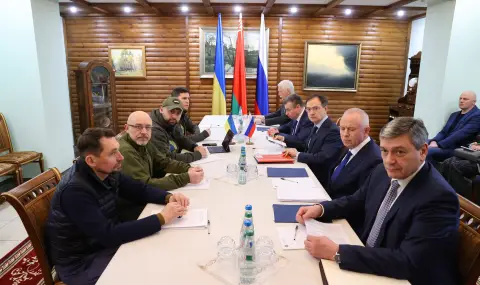Russia and Ukraine are set to meet for peace talks the likes of which have not taken place since the opening weeks of the war.
Here's a brief rundown of what was on the table at the last talks between the two countries in 2022 and why those talks failed, writes BTA, citing "Reuters".
Where and when did the talks take place?
Russian and Ukrainian negotiators first met in Belarus on February 28, 2022, four days after the full-scale Russian invasion. They later held video meetings, before meeting again in person in Istanbul on March 29. By mid-April, the parties had exchanged numerous draft documents before the talks collapsed.
What was discussed?
- According to the drafts, published last year by the "New York Times", Ukraine was prepared to remain a permanently neutral, non-aligned and non-nuclear state, with no foreign troops or weapons on its territory. These conditions would have prevented it from joining NATO but allowed it to join the EU.
- In return, Ukraine was to receive security guarantees from a group of countries, including the five permanent members of the UN Security Council – Britain, China, Russia, the United States and France.
- According to a partially agreed document, the guarantor countries, including Russia, were to respect and observe the independence and sovereignty of Ukraine and refrain from threats or use of force against it.
- The draft proposed that within 10-15 years there should be new negotiations on the status of Crimea, which Russia annexed from Ukraine in 2014.
What were the key points of disagreement?
- Ukraine demanded that, if attacked, the guarantor countries provide it with assistance, which includes "closing the airspace over Ukraine, providing the necessary weapons, using armed force to restore and subsequently maintain the security of Ukraine as a permanently neutral state". Russia insisted that any such decision be made with the consent of all the guarantor countries – which meant that Moscow would have a veto.
- The two sides were also at loggerheads over the future size of the Ukrainian armed forces and the Ukrainian military arsenal. For example, Kiev was willing to agree to a cap of 250,000 troops with 800 tanks and a maximum range of missiles of up to 280 km. Russia wanted Ukraine to limit itself to 85,000 troops, 342 tanks and missiles with a range of 40 km.
- Moscow demanded that Ukraine recognize Russian as the official state language in the country and end the "discrimination against the Russian-speaking population", which Kiev denies.
- Russia demanded the repeal of what it calls "Ukrainian laws on nazification and glorification of Nazism". Ukraine has dismissed the accusations of Nazism as absurd.
Why did the talks fail?
By April 2022, the tide on the battlefield seemed to be turning in Ukraine’s favor. It had pushed Russian forces out of Kiev and presented evidence to the world of alleged Russian war crimes that had drawn international condemnation, though Moscow denied it.
Western countries had increased military aid to Kiev and tightened sanctions on Moscow – all factors that made Ukraine less likely to agree to Russian demands, according to a detailed account of the peace talks in the journal "Foreign Affairs" by historian Sergei Radchenko and analyst Samuel Sharap.
Are the 2022 drafts still relevant?
US special envoy Steve Witkoff said in February that the so-called Istanbul protocols offer "guidelines" for negotiations between the two warring parties.
A Kremlin adviser said on Sunday that the peace talks now proposed must take into account the 2022 talks and the fact that Russia now controls nearly a fifth of Ukraine's territory.
In December 2024, Ukrainian President Volodymyr Zelensky said there were no "Istanbul agreements", only talks in which Ukraine responded to the "ultimatum" Russia, but has not signed anything.
What changed after the failed talks?
The initial talks focused mainly on sovereignty issues, but Russia's position has since hardened to include specific territorial demands. President Vladimir Putin said in June 2024 that Ukraine must completely withdraw from four regions of the country - Donetsk, Luhansk, Zaporizhia and Kherson regions, which Russia claims but only partially controls.
Ukraine has said it will never recognize Russia's occupation of Ukrainian soil as legitimate. At the same time, Zelensky acknowledged that his forces are not currently capable of returning all of the lost territory and that it can be restored over time through diplomatic means.
